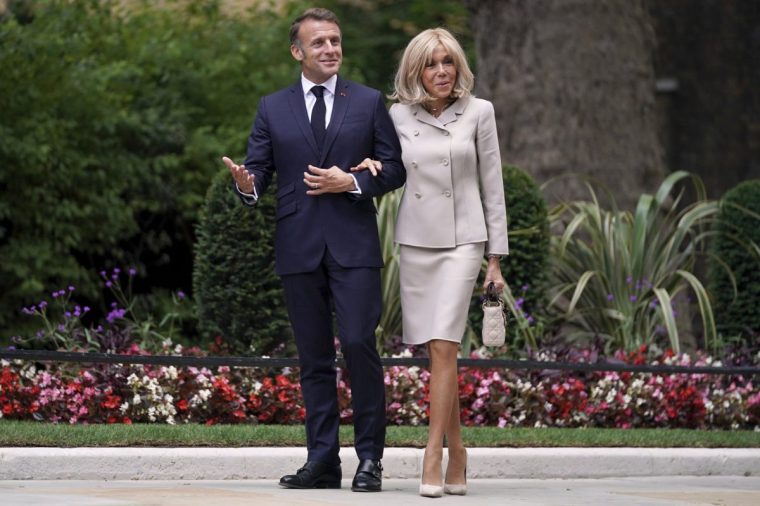There is a peculiarly French quality to the spectacle unfolding in a Paris courtroom this week, as ten defendants stand accused of cyberbullying the French First Lady.
The group are being prosecuted for their part in spreading a wild conspiracy theory that Brigitte Macron, the wife of President Emmanuel Macron, is secretly a transgender man who replaced her own brother.
France prides itself on a romantic ideal of public life, a republic where love stories may be unconventional but are handled discreetly. Presidents and their paramours have traditionally been tolerated, even tacitly celebrated.
The Macrons’ relationship, forged when he was a teenage drama student and she was his married teacher, already invited an unusual degree of curiosity. It also made fertile ground for conspiracies and an obsession that has leapt borders, platforms and political ecosystems.
The current court case targets individuals well known in France’s conspiracy circles, including Aurélien Poirson-Atlan, once the anonymous “Zoé Sagan,” and the medium-turned-YouTube-pundit Delphine J.
Pro-Trump influencer Candace Owens has also packaged the rumour for her US audience, calling it “the greatest political scandal in human history,” while pushing views and merchandise along the way.
Brigitte Macron could have remained silent, hoping the lies would expire on their own. Instead, the First Lady has pursued the slow grind of the legal system.
This reflects not just personal hurt but also a deeply French legal instinct.

Unlike in the US or UK, France has built reputation into the very architecture of its speech laws. Personality rights are protected alongside privacy; defamation is a criminal matter; insults against a public figure’s dignity are actionable in ways that astonish Anglo-Saxon jurists. Cyberbullying can result in prison time.
These laws are rooted in French republicanism: citizens are entitled to honour, while discourse should be vigorous but not dehumanising.
The presidency itself retains a near-sacred aura, which extends to the person closest to the head of state. An attack on the First Lady’s womanhood is framed as an attack on the republic’s values.
Yet, Parisian legal elegance is now colliding with the swamp logic of modern-day conspiracy culture.
Even when the First Lady has won cases in court, rulings have slipped through her fingers. In July, a court overturned a defamation conviction against two women who had helped propel the rumour in 2021, finding that claiming a woman was “born a man” did not directly constitute an illegal insult to her honour. The Macrons have appealed, refusing to accept a precedent that treats transphobic insinuation as legally harmless.
Brigitte Macron’s complaint has required police to identify and arrest only a thin representative slice of the hundreds of individuals spreading the rumours, while the conspiracy theory regenerates online with Hydra-like persistence. When Zoé Sagan’s account was suspended, “Lia Sagan” promptly appeared to take up the baton.
The court cases are not without risk for the First Family. To prove cyberbullying, prosecutors may need evidence of psychological harm. Brigitte Macron has refused psychiatric evaluation, despite acknowledging the pain caused by the relentless mockery echoing through daily life.
In the US, where the Macrons are suing Owens, the legal bar is far higher. Public figures must prove “actual malice”.
One can already glimpse the nightmare scenario: a First Lady pressed to undergo “physiological tests” to prove she is a woman, simply to rebut a fantasy engineered for clicks. That alone illustrates how unwinnable such battles can prove to be.
Would this play out similarly in the UK?
British political spouses generally stay out of the courts and the spotlight. The rich do sometimes launch legal actions and damages help keep some of the media in check. But most public figures avoid feeding the trolls by making courtroom theatre out of fringe abuse.
The Royal Family is perhaps the nearest equivalent to the French First Family, and they rarely comment on tabloid rumours: they are expected to “put up and shut up”. In recent years, only Prince Harry has gone to court to challenge the media.
In France, the personal remains political. The President’s private life has long been a source of fascination and anxiety. Brigitte Macron is essentially placing a bet that the courts can still impose shame on those who operate without it online.
If she wins, her case could set a rare precedent against digital cruelty. If she loses, she will have given oxygen to an absurd conspiracy – while failing to quell questions about her womanhood.
